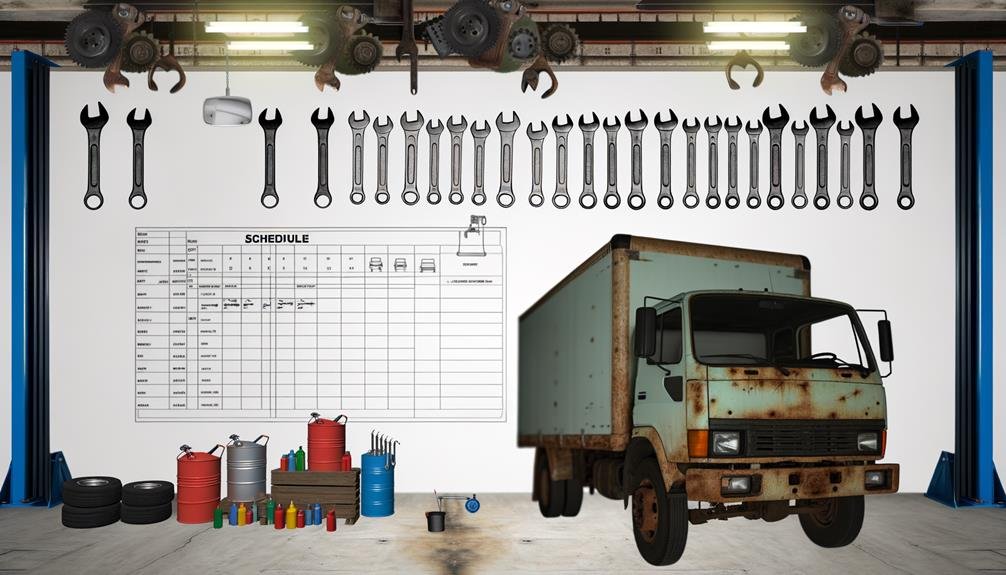Charles Miller is a veteran bike enthusiast with over 12 years of experience dealing with bikes as a mechanic. Despite immense love and expertise for...
Understanding the lifespan of a box truck in terms of miles traveled is critical not only for those in the logistics and transportation industry, but also for potential buyers considering the purchase of used vehicles.
Various factors come into play, from the type of engine and the brand of the vehicle, to the maintenance history and the conditions under which the truck is typically operated. While one could argue that with proper maintenance, a box truck could potentially cover up to 15 million miles, a range of considerations could influence this figure.
As we explore this subject further, we will illuminate the key variables that can either limit or extend the longevity of a box truck.
- Key Takeaways
- Understanding Box Truck Lifespan
- Brand-Based Box Truck Longevity
- Key Factors Affecting Box Truck Lifespan
- The Cost of Poor Maintenance
- Performance Impact on Truck's Mileage
- Effect of Overloading on Lifespan
- Tires and Box Truck Longevity
- Service and Maintenance Schedule
- Lifespan of Used Box Trucks
- Cold Starts and Engine Wear
- Frequently Asked Questions
- Conclusion
Key Takeaways
- The type of engine, whether diesel or gas, is a significant factor in determining the lifespan of a box truck.
- Regular maintenance and proper servicing are crucial for extending the lifespan of a box truck.
- Selecting the right truck based on specific needs and conditions, as well as considering mileage requirements, can impact the lifespan of the vehicle.
- Brand reputation and the quality of build and components used in the truck can also influence its longevity.
Understanding Box Truck Lifespan
Comprehending the lifespan of a box truck necessitates an understanding of numerous factors. These factors include the type of engine utilized, the importance of consistent maintenance, and the careful selection of the right truck based on specific needs and conditions.
Engine type plays a critical role in the box truck lifespan. Diesel engines, known for their durability and efficiency in heavy-duty applications, can last between 250,000 and 300,000 miles. On the other hand, gas engines, although less durable, can cover approximately 155,000 miles with consistent maintenance.
Maintenance cannot be overstated in understanding box truck lifespan. A well-maintained vehicle, replete with regular oil changes, filter replacements, and thorough inspections, can significantly extend its lifespan.
Choosing the right truck is also paramount. Evaluating the previous owner's maintenance history, assessing driving conditions, and determining the expected mileage required are all vital steps in this process. For instance, a good mileage for a used gas engine box truck would be less than 100,000 miles, and under 200,000 miles for a diesel engine truck.
In essence, calculating how many miles a box truck can last is a multifaceted process requiring a broad understanding of these variables.
Brand-Based Box Truck Longevity
When considering the longevity of box trucks, it's crucial to assess the impact of brand-based variances.
Each manufacturer, from Freightliner and Ford to Chevrolet, GMC, and Hino, offers different lifespan projections based on their reputation, build quality, and recommended maintenance schedules.
This discussion will provide a comparative analysis of key manufacturers, examine the influence of brand reputation, and explore the correlation between adequate maintenance and brand longevity.
Key Manufacturer Lifespan Comparisons
Examining various key manufacturers, it becomes apparent that the longevity of a box truck can vary significantly. Notable examples include:
- Freightliner trucks, capable of reaching up to 700,000 miles, demonstrating the upper limits of box truck endurance.
- Ford and GMC trucks, with an average lifespan typically lasting between 200,000 to 300,000 miles, provide a solid, reliable performance.
- Chevrolet Express trucks, reaching about 300,000 miles, offering a comparable lifespan.
- Hino trucks, boasting a remarkable lifespan of 500,000 to 600,000 miles when well-maintained, showcasing the impact of diligent upkeep.
These key manufacturer lifespan comparisons provide a useful guide when considering the purchase of a used box truck, and underscore the significance of regular maintenance in extending the average lifespan of these vehicles.
Impact of Brand Reputation
While the lifespan of a box truck can vary significantly across different manufacturers, it's also crucial to acknowledge the substantial impact of brand reputation on box truck longevity. Brands with a strong reputation often have stringent quality control standards, superior materials, and advanced engineering, all of which contribute to how long a box truck lasts. Moreover, the previous owner's maintenance practices can be influenced by the brand reputation.
| Brand | Impact on Box Truck Longevity |
|---|---|
| Brand A | Exceptional durability |
| Brand B | Superior engineering |
| Brand C | Quality materials |
| Brand D | Rigorous quality control |
| Brand E | Previous owner satisfaction |
Choosing a reputable brand thus becomes an essential step in ensuring the longevity and reliability of your box truck.
Maintenance and Brand Longevity
The longevity of a box truck, regardless of its brand, hinges significantly on the regularity and quality of its maintenance. The maintenance and brand longevity of a box truck are key factors that determine how many miles it can last before it may need service.
Regular maintenance is essential for:
- Maximizing the lifespan of gas engines, which can last around 155,000 miles.
- Diesel engines, which have a longer lifespan, lasting between 250,000 and 300,000 miles.
Brand longevity is influenced by:
- The quality of the build and components used.
- The reputation of the brand for durability and reliability.
Key Factors Affecting Box Truck Lifespan
Several key factors significantly influence the lifespan of a box truck. The type of engine, such as diesel or gas, plays a vital role in determining how many miles a box truck can last. Diesel engines, for example, are reputed for their longevity.
Another key factor affecting a box truck's lifespan is driving conditions. Long-distance driving on highways is typically less stressful on the vehicle than short, stop-and-start city driving. This difference in driving conditions can significantly impact the truck's performance and longevity.
Furthermore, the overall vehicle condition is critical. Regular maintenance and proper servicing ensure the truck stays in good shape, extending its lifespan. Neglecting these aspects can lead to premature wear and tear, cutting short the expected lifespan of the truck.
The Cost of Poor Maintenance

The cost implications of poor maintenance on a box truck's lifespan are significant.
The regular servicing of a box truck, often overlooked, plays a pivotal role in preventing premature engine wear and avoiding higher repair costs.
Additionally, the impact of road conditions, exacerbated by lack of maintenance, can further increase operational costs and decrease fuel efficiency, while posing potential safety hazards.
Neglecting Regular Servicing
In the realm of box truck operations, neglecting regular servicing can result in substantial repair costs and a significant reduction in overall vehicle lifespan. The importance of regular maintenance, such as frequent oil changes, cannot be overstated.
Here are two crucial aspects to consider:
- Engine Care
- Ensuring the oil is changed regularly is essential for keeping the engine working properly. Neglecting this can lead to accelerated engine wear and breakdowns.
- Safety and Performance
- Poor maintenance can decrease fuel efficiency and create safety hazards like brake failures or tire blowouts.
Proper maintenance is a small investment compared to the costs of neglecting regular servicing. This is not just about saving money, but also ensuring the longevity and safety of your box truck.
Impact of Road Conditions
Navigating through poor road conditions takes a significant toll on the longevity and operational efficiency of a box truck, inflating maintenance costs and potentially reducing its overall lifespan.
High mileage on rough roads can introduce substantial wear and tear, affecting critical components like suspension and tires. The impact of road conditions should not be underestimated when considering how many miles a box truck can last.
Uneven surfaces, potholes, and poorly maintained roads increase fuel consumption, leading to reduced efficiency. Frequent replacements of shocks, struts, and tires may become necessary, further impacting the vehicle's lifespan.
Thus, it becomes evident that the state of the roads plays a crucial role in determining the life expectancy of a box truck.
Performance Impact on Truck's Mileage
Understanding the performance impact on a box truck's mileage requires a careful examination of several key factors.
Regular maintenance:
- Ensuring your truck is serviced regularly can significantly impact the truck's mileage. The engine, transmission, and tires all require routine checkups to ensure optimal performance.
Driving conditions:
- The environment in which the truck is driven can also affect its mileage. City driving, with its constant start-and-stop, impacts mileage negatively compared to long stretches of highway driving.
Operating habits:
- Operating habits, such as cold engine starts and abrupt stops, can exert strain on the engine, thereby reducing the truck's mileage.
Vehicle condition:
- The overall vehicle condition, particularly the state of the engine and transmission, plays a vital role in determining mileage.
Engine type:
- The type of engine also significantly influences mileage; for instance, a diesel engine is typically more fuel-efficient than a gasoline one.
Effect of Overloading on Lifespan

The impact of overloading on the lifespan of a box truck is a critical aspect that must be taken into account. Overloading, beyond the designated weight limit, can significantly impair the durability of the vehicle, lead to frequent maintenance, and shorten its lifespan.
A comprehensive understanding of these implications can help ensure optimal performance and longevity of the truck.
Overloading Impact on Durability
While it may seem advantageous to load a box truck to its maximum capacity for efficiency, such overloading can have a substantial adverse impact on the vehicle's longevity, leading to a significant reduction in its lifespan. This overloading impact on durability is due to a few key factors:
- Strain on components:
- Engine: The additional weight demands more power, straining the engine and causing it to wear out faster.
- Transmission: Overloading puts extra pressure on the transmission, leading to potential failures.
- Structural and safety issues:
- Suspension and brakes: Overweight loads strain the suspension system and can impair braking performance, increasing the risk of accidents.
- Structural damage: Continually exceeding the box truck's weight capacity can cause structural damage, compromising the vehicle's overall integrity.
Weight Limits and Maintenance
Invariably, adherence to weight limits and regular maintenance play critical roles in mitigating the detrimental effects of overloading on the lifespan of a box truck.
Overloading, as specified by the Department of Transportation, can strain a truck's engine, suspension, cooling, and braking systems, significant factors in the premature degradation of its structure and performance.
Regular maintenance, provided by expert service such as the Truck Center, is crucial in maintaining the longevity and safety of the box truck. This includes regular checks and servicing of brakes, tires, and the engine.
Weight limits and maintenance, therefore, are not just regulatory procedures, but a proactive approach to maximizing a box truck's lifespan, ensuring its optimal performance and safety.
Tires and Box Truck Longevity
Significantly affecting the lifespan of a box truck, tires and their regular maintenance play an essential role in the vehicle's overall longevity. This is a key factor to consider when discussing 'how many miles can a box truck last'.
Proper tire care, including regular checks, rotations, and replacements, can significantly extend box truck longevity. Such maintenance helps to ensure tires remain in optimal condition, reducing the risk of breakdowns and accidents.
- Regular checks:
- Monitor for signs of wear and tear.
- Check for any punctures, cuts, or bulges.
- Rotations and replacements:
- Rotate tires regularly to ensure even wear.
- Replace worn tires promptly to maintain safety and performance.
The driving conditions and terrain on which the box truck operates also affect tire wear and box truck longevity. Regular monitoring of tire pressure is crucial for maintaining optimal performance.
Choosing the right tires for the specific needs and conditions of the box truck is also a key factor in its overall longevity. When all these factors are considered and managed effectively, tires can contribute significantly to ensuring your box truck achieves its maximum possible lifespan.
Service and Maintenance Schedule

How essential is a regular service and maintenance schedule to the longevity of a box truck, you might ask? The answer is straightforward – it's crucial. Following a regular service and maintenance schedule is fundamental to extending the years of use of the truck. It is an essential practice, as important as the truck's initial purchase.
Proper adherence to the manufacturer's service and maintenance schedule, which includes routine oil changes, filter replacements, and thorough inspections, can drastically reduce the risk of major breakdowns. This, in turn, significantly boosts the lifespan of the box truck.
However, it's equally important to note that the maintenance costs should be factored into the overall vehicle cost to ensure it's adequately maintained. Forgoing regular maintenance in an attempt to save money could result in a shorter truck life and more expensive repairs in the long run.
Professional guidance from truck dealers or experts is invaluable in this area. They can provide additional insight into the service and maintenance schedule, ensuring your truck stays in optimal condition for as long as possible. In essence, a well-maintained box truck is a long-lasting truck.
Lifespan of Used Box Trucks
Delving into the lifespan of used box trucks, it's important to note that with proper maintenance, diesel engines can last between 250,000 and 300,000 miles, while gas engines can endure approximately 155,000 miles. This significant discrepancy, mainly due to inherent engine differences, is a crucial consideration when determining how many miles a box truck can last.
These figures provide a general guide, but individual truck lifespans can vary widely based on numerous factors:
- Maintenance Regime:
- Regular, proactive maintenance can significantly enhance a truck's lifespan.
- Neglecting maintenance can drastically shorten it.
- Usage Conditions:
- Trucks subjected to tough conditions, such as heavy loads or harsh weather, may have shorter lifespans.
- Those used more gently can potentially exceed the average mileage.
When purchasing a used box truck, thorough evaluation of its condition is essential. The vehicle's mileage provides a clue about its remaining lifespan, but it's also crucial to investigate its maintenance history and overall care. Remember, a well-maintained truck can last much longer than one that's been neglected.
Ultimately, understanding the lifespan of used box trucks is a critical part of making a wise, informed investment in a vehicle.
Cold Starts and Engine Wear

Turning our attention to the issue of cold starts and engine wear, it is crucial to understand that initiating engine function in cold conditions can exacerbate wear due to insufficient lubrication. This is particularly relevant for box trucks, which are often subjected to demanding conditions that can increase engine wear.
When the engine is cold, its oil may not have the necessary viscosity to adequately lubricate all components. This lack of lubrication can lead to increased friction, resulting in wear and tear on critical engine parts. Moreover, cold starts can also trigger inefficient combustion, contributing to increased fuel consumption and emissions.
To mitigate the impact of cold starts and engine wear, operators can use block heaters in colder climates. These devices warm the engine before starting, enhancing oil flow and reducing wear. It is also beneficial to allow the engine to warm up before driving.
Abrupt stops, which cause rapid temperature changes and stress on engine components, can further exacerbate wear. Therefore, a mindful approach to starting and stopping, especially in colder climates, can significantly prolong the lifespan of box truck engines. This thoughtful consideration to engine care underscores our collective responsibility for the vehicles we operate.
Frequently Asked Questions
How Many Miles Is Too Many for a 26ft Box Truck?
A 26ft box truck's mileage varies based on factors like truck maintenance, fuel efficiency, and operational costs. However, a well-kept diesel engine can exceed 300,000 miles, while a gas engine may reach around 155,000 miles.
Should I Buy a Box Truck With 200k Miles?
Purchasing a box truck with 200k miles can be a sound decision, considering its maintenance history. Truck maintenance and mileage impact its longevity. Evaluate financing options to ensure it aligns with your budget.
What Is the Useful Life of a Box Truck?
The useful life of a box truck largely depends on truck maintenance, depreciation factors, and resale value. With diligent care and upkeep, a well-maintained box truck can potentially serve for over 300,000 miles.
How Many Miles Do You Get Out of a Box Truck?
A box truck's mileage depends on fuel efficiency, regular maintenance, and durability factors. Diesel engines can run up to 300,000 miles, while gas engines average 155,000 miles, both with consistent care and upkeep.
Conclusion
In conclusion, the lifespan of a box truck is influenced by numerous elements, including engine type, maintenance regime, driving conditions, and tire longevity. With adequate attention to these factors, the potential for a truck to achieve upwards of 15 million miles is possible.
However, neglecting maintenance or exposing the vehicle to harsh conditions could drastically shorten this lifespan.
Thus, understanding the key determinants of box truck longevity is crucial to maximizing its operational life.

Charles Miller is a veteran bike enthusiast with over 12 years of experience dealing with bikes as a mechanic. Despite immense love and expertise for his Tacoma, he rides his Trek Ebike more. Anytime you meet him, you’ll either hear him talking about Bikes, or writing about all things bikes and cars on this blog.
More Posts


